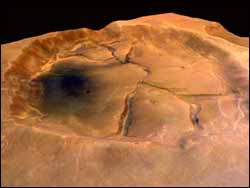Fractured crater near Valles Marineris

Fractured crater near Valles Marineris <br>
This perspective image of a fractured crater near Valles Marineris on Mars was obtained by the High Resolution Stereo Camera (HRSC) on board the ESA Mars Express spacecraft.
The image was taken during orbit 61 in January 2004 with a resolution of 12. 5 metres per pixel. It shows part of a cratered landscape to the north of the Valles Marineris, at 0.6° S latitude and 309° E longitude, with this crater having a fractured base.
This crater has a rim diameter of 27.5 kilometres and is about 800 metres deep. It is not known yet how these fractures are generated. On Earth, polygonal fractures may occur in contracting material, which breaks at weak zones. For example, we may see this appearing in cooled lava, dried clay or frozen ground.
Media Contact
More Information:
http://www.esa.intAll latest news from the category: Earth Sciences
Earth Sciences (also referred to as Geosciences), which deals with basic issues surrounding our planet, plays a vital role in the area of energy and raw materials supply.
Earth Sciences comprises subjects such as geology, geography, geological informatics, paleontology, mineralogy, petrography, crystallography, geophysics, geodesy, glaciology, cartography, photogrammetry, meteorology and seismology, early-warning systems, earthquake research and polar research.
Newest articles

Parallel Paths: Understanding Malaria Resistance in Chimpanzees and Humans
The closest relatives of humans adapt genetically to habitats and infections Survival of the Fittest: Genetic Adaptations Uncovered in Chimpanzees Görlitz, 10.01.2025. Chimpanzees have genetic adaptations that help them survive…

You are What You Eat—Stanford Study Links Fiber to Anti-Cancer Gene Modulation
The Fiber Gap: A Growing Concern in American Diets Fiber is well known to be an important part of a healthy diet, yet less than 10% of Americans eat the minimum recommended…

Trust Your Gut—RNA-Protein Discovery for Better Immunity
HIRI researchers uncover control mechanisms of polysaccharide utilization in Bacteroides thetaiotaomicron. Researchers at the Helmholtz Institute for RNA-based Infection Research (HIRI) and the Julius-Maximilians-Universität (JMU) in Würzburg have identified a…



